Why you can trust Tom's Hardware
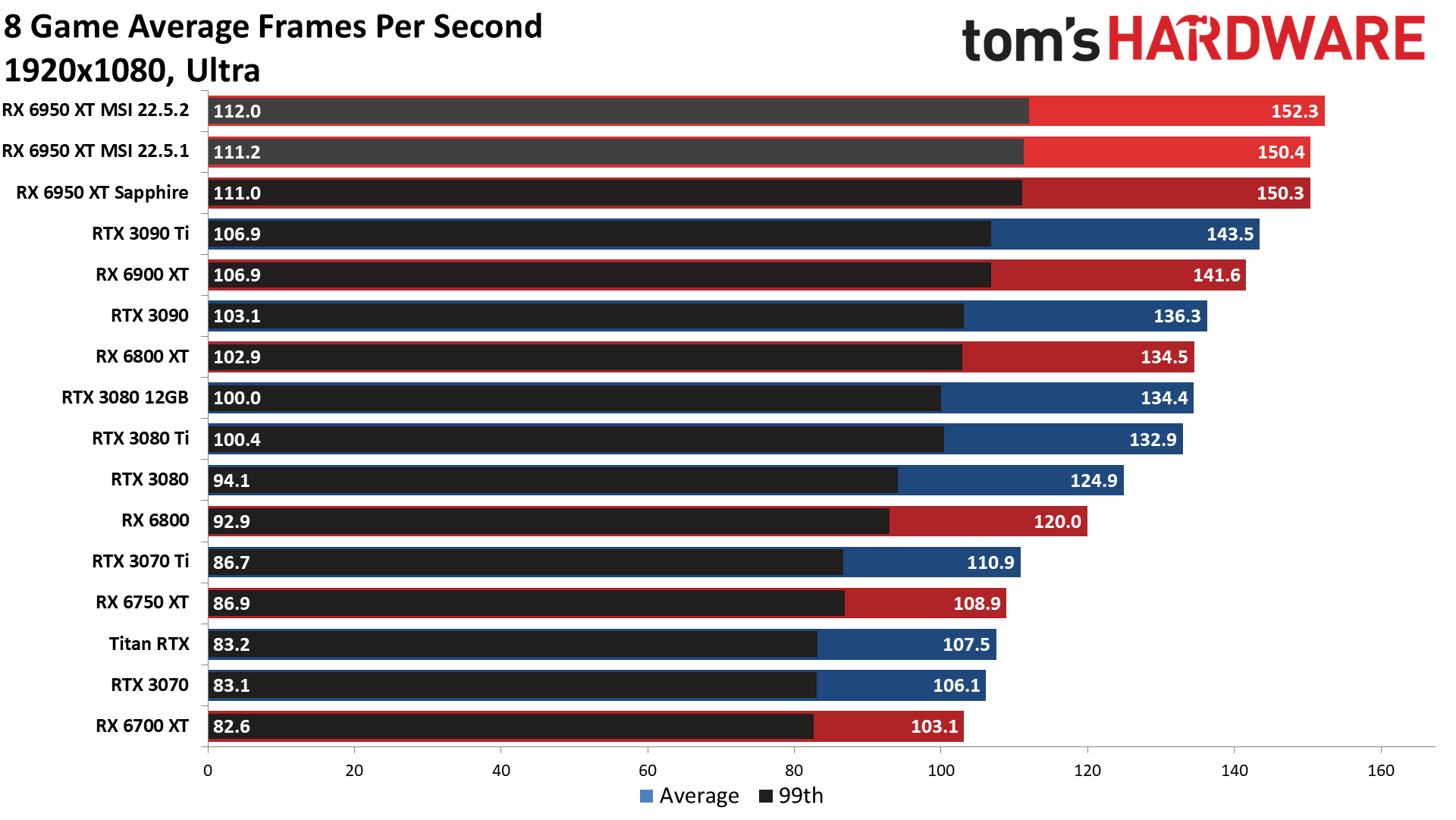
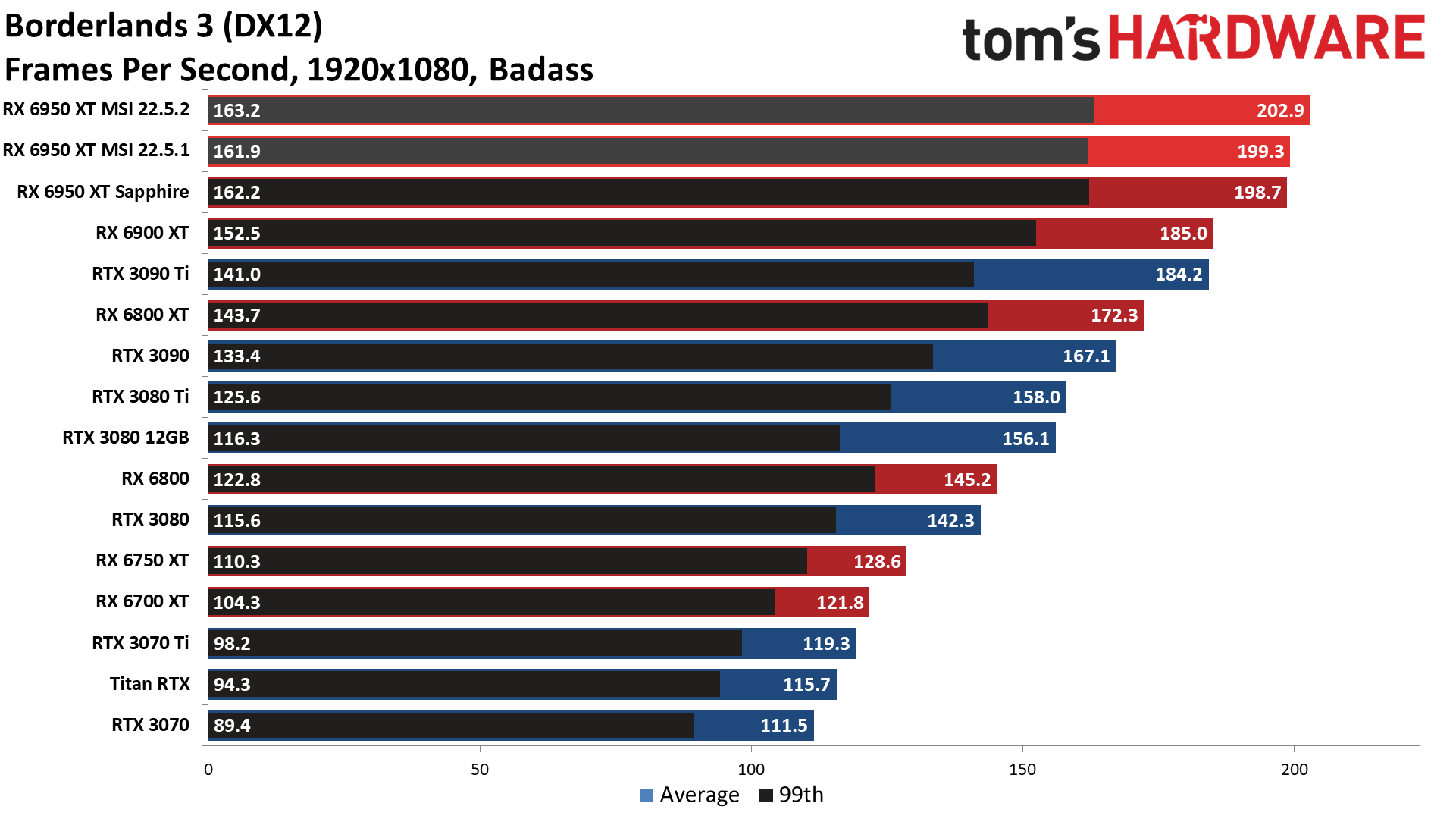
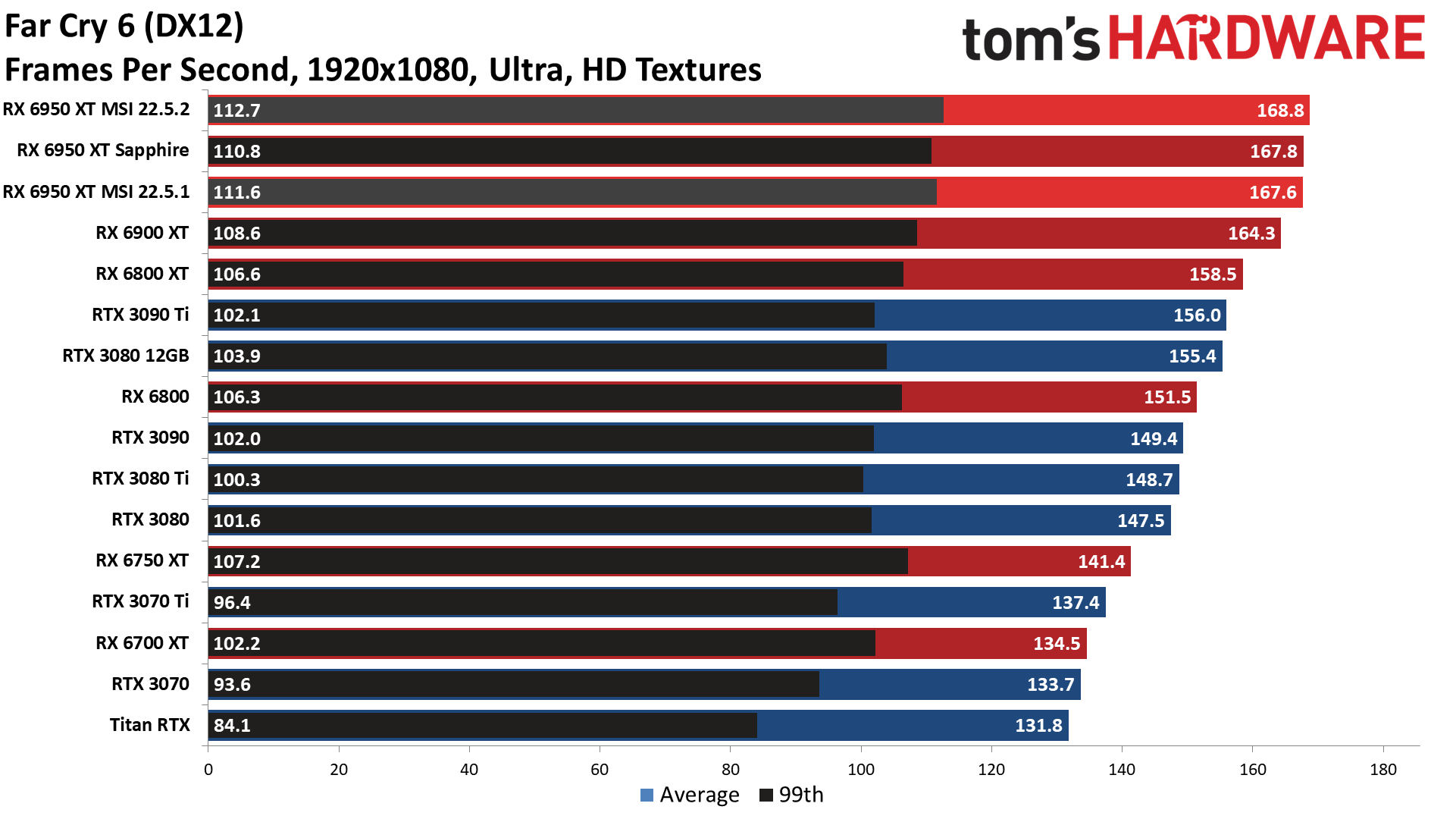
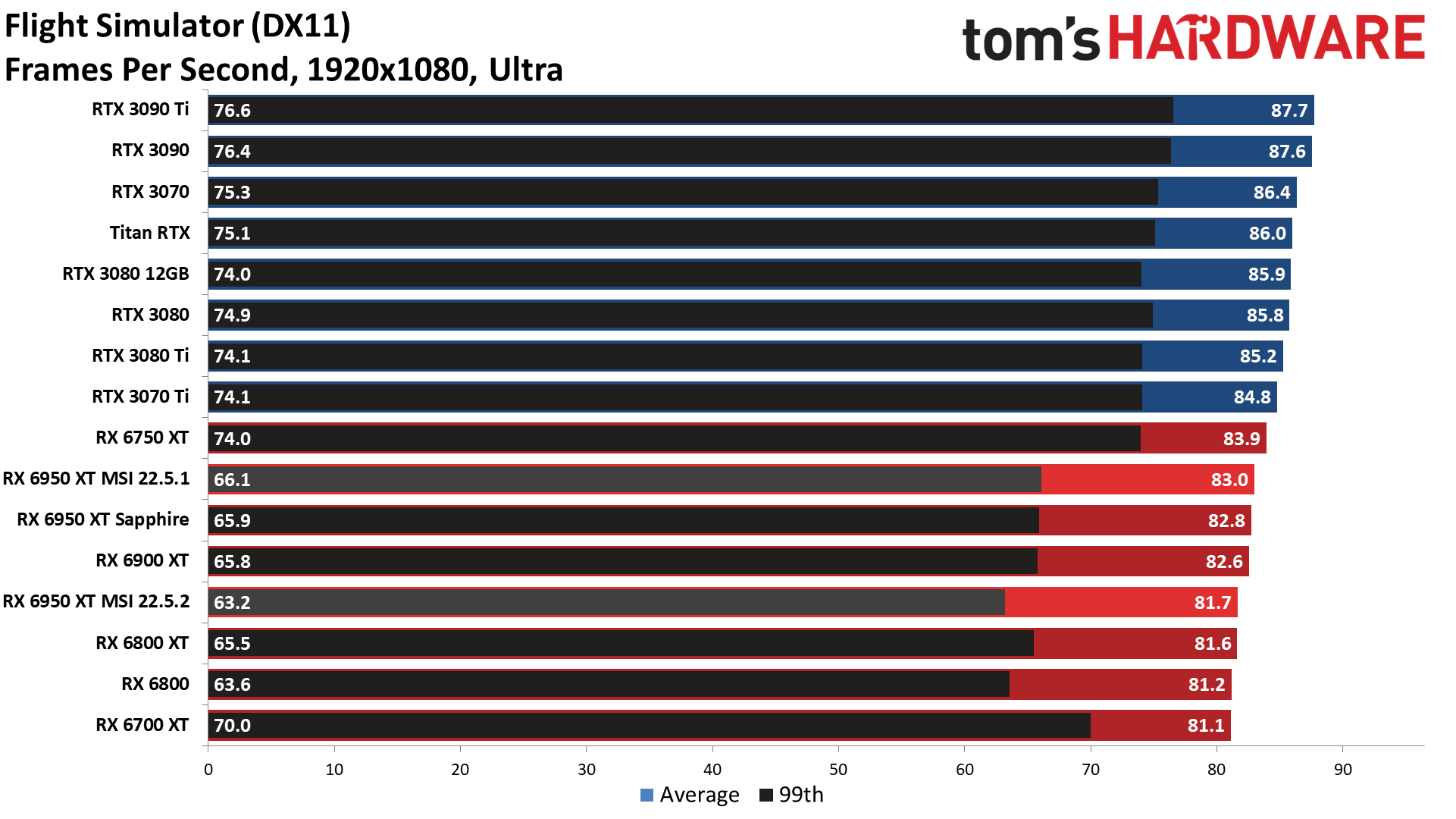
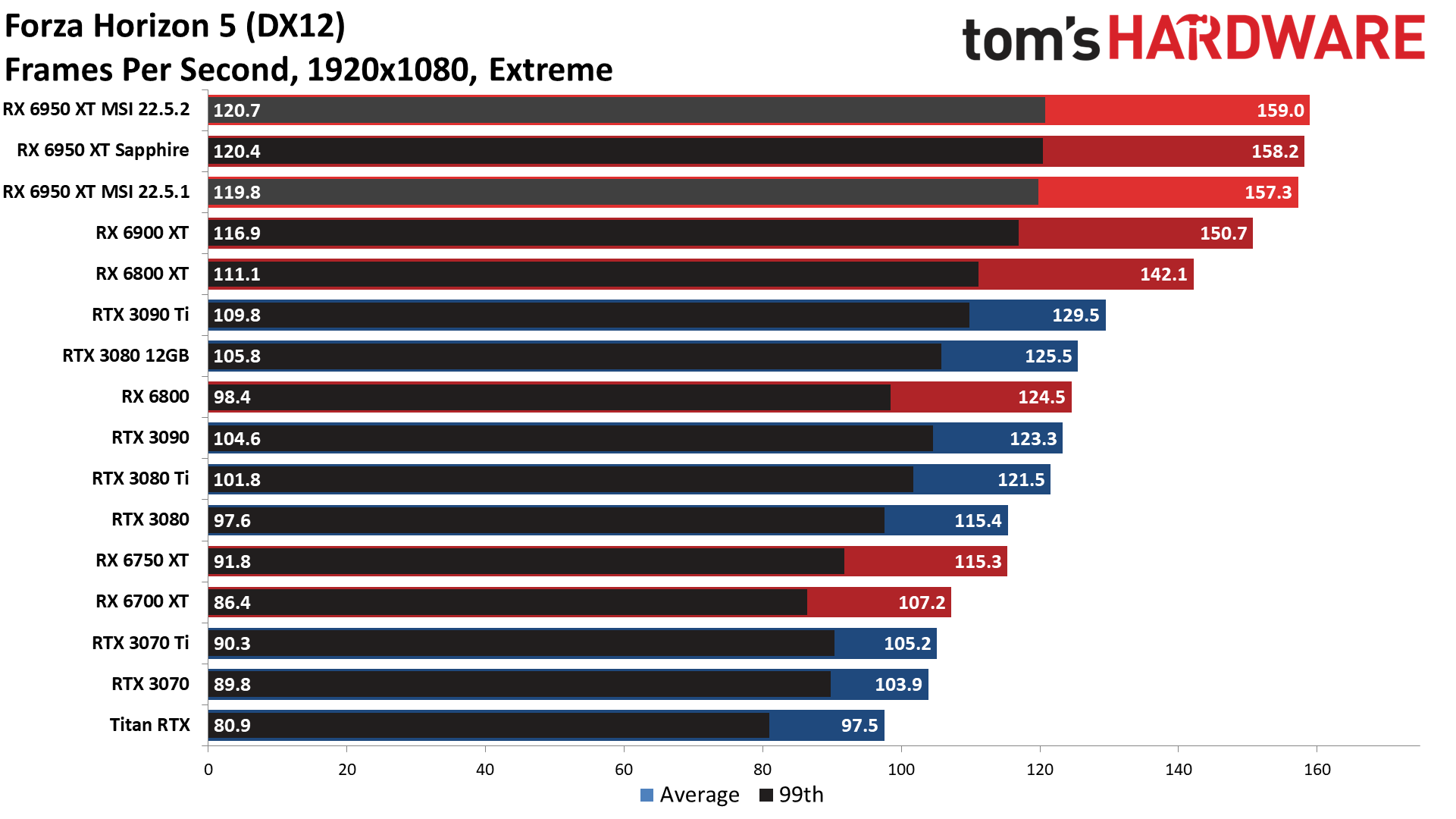
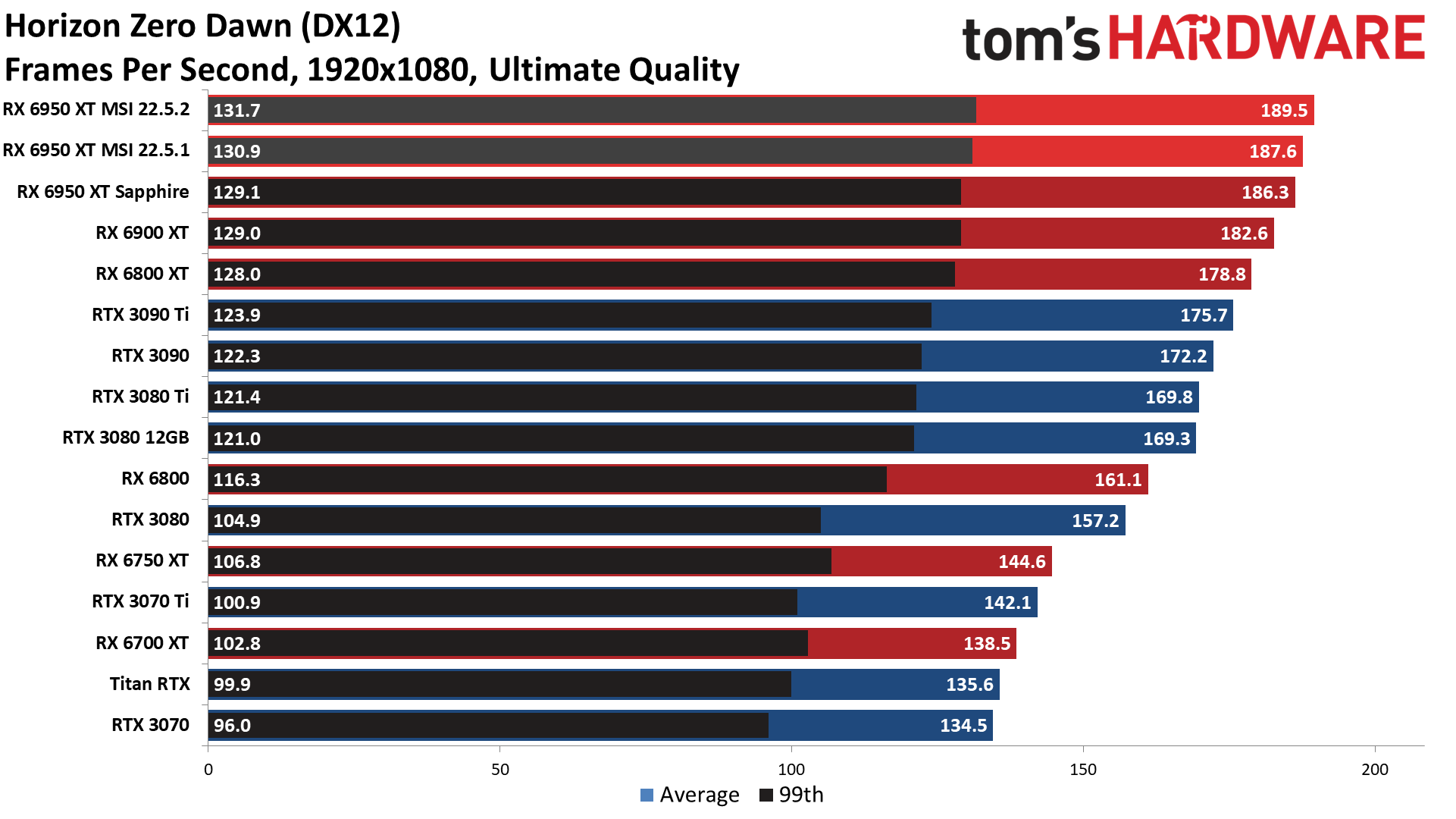
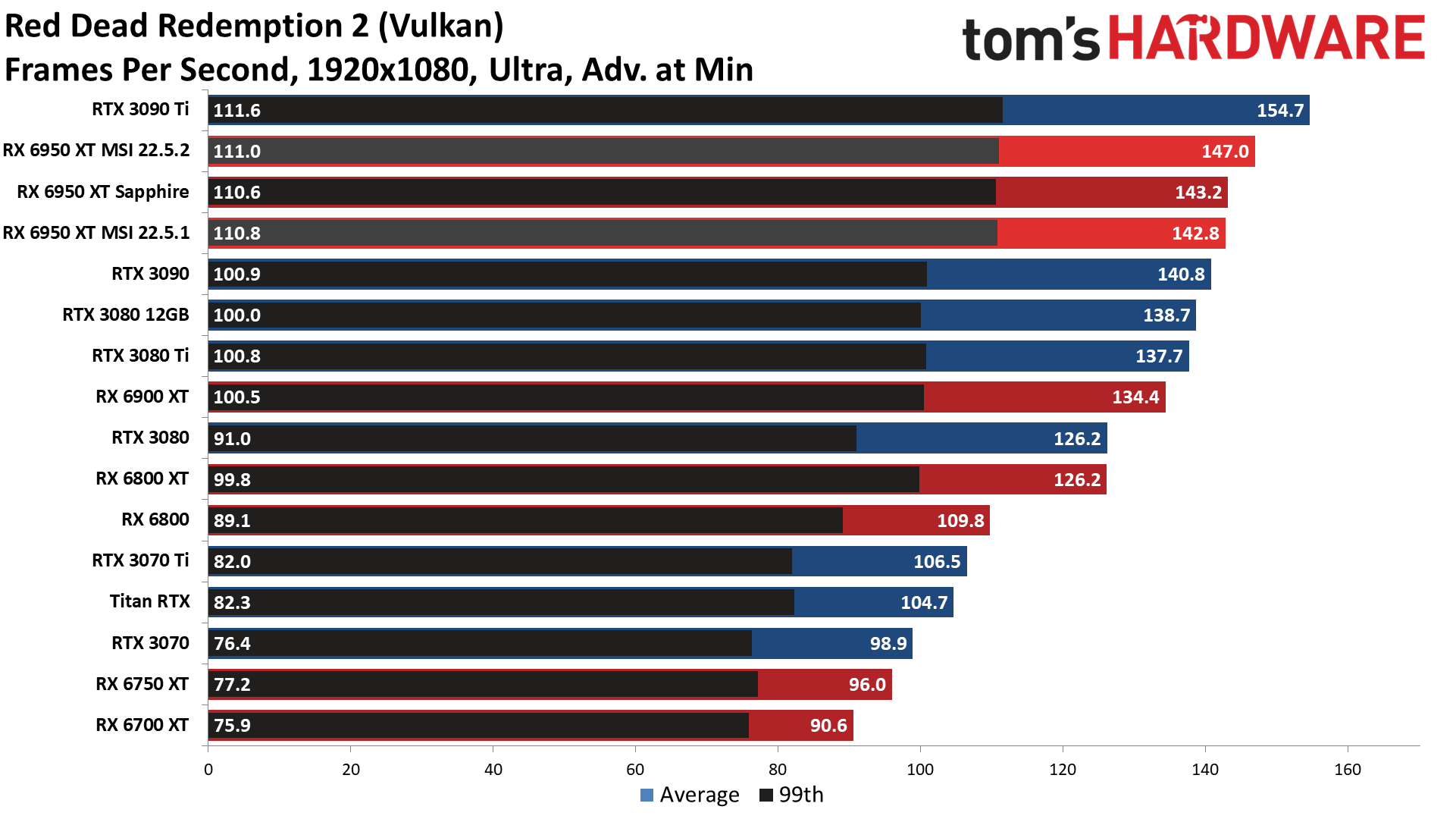
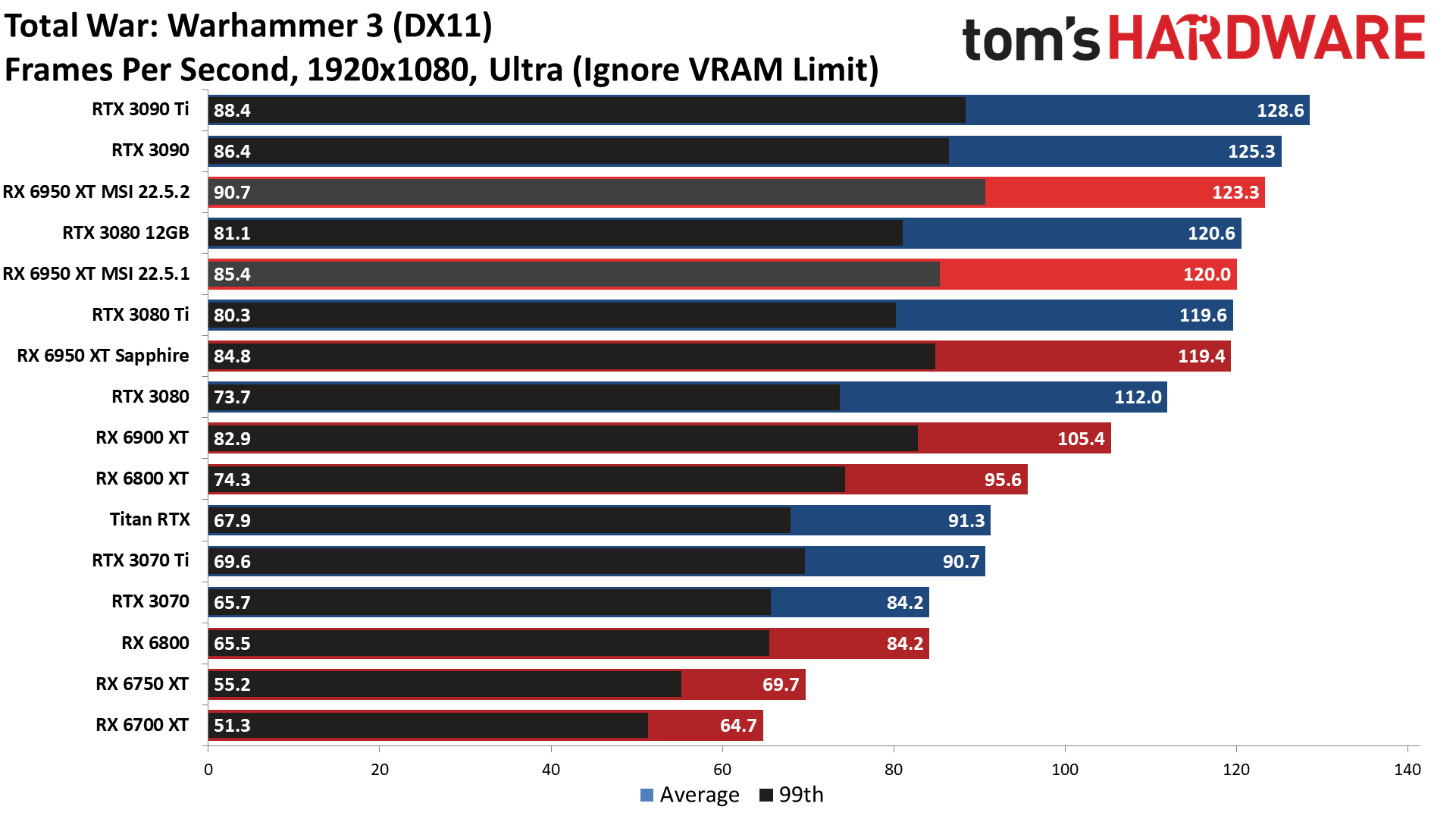
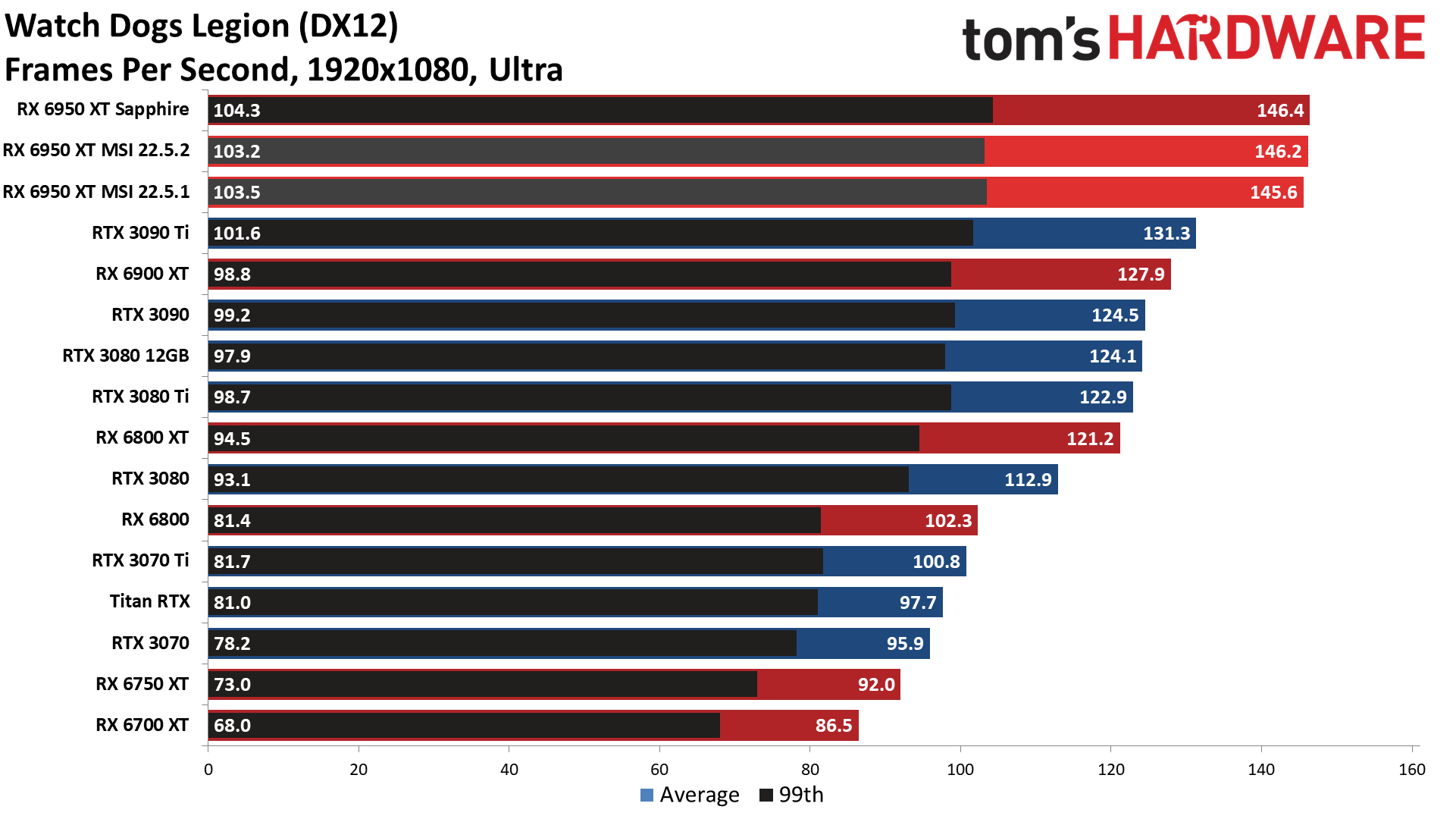
Wrapping up our performance testing, we have 1080p ultra, and the RX 6950 XT once more reigns supreme. We started to hit CPU bottlenecks at this resolution, and the 6950 XT was only 20% faster at 1080p than at 1440p. Some games might be able to push hundreds of frames per second, but many will still struggle to take advantage of even 144Hz refresh rates, never mind the 240Hz, 360Hz, and even 480Hz displays that are now being marketed to esports professionals.
MSI's card took the top spot, with the updated drivers again improving overall performance by a mere 1.3%. We've heard of much larger gains when using the Ryzen 9 5950X, and AMD's CPUs appear to have been a major target with the DX11 improvements. Using an Alder Lake Core i9-12900K, the biggest improvement we measured out of all the gaming tests was only 3.7%, in Total War: Warhammer 3 at 1080p medium settings.
Nvidia still held onto the lead in Flight Simulator, Forza Horizon 5, and Red Dead Redemption 2, but the remaining games all have AMD in the lead, with a 6% overall average lead. The individual games range from the MSI RX 6950 XT being anywhere from 7% slower than the Asus RTX 3090 Ti (Flight Simulator) to as much as 23% faster (Forza Horizon 5). We didn't include the 1080p medium charts here, but the overall standings were the same as at 1080p ultra, with AMD holding a 6% lead.
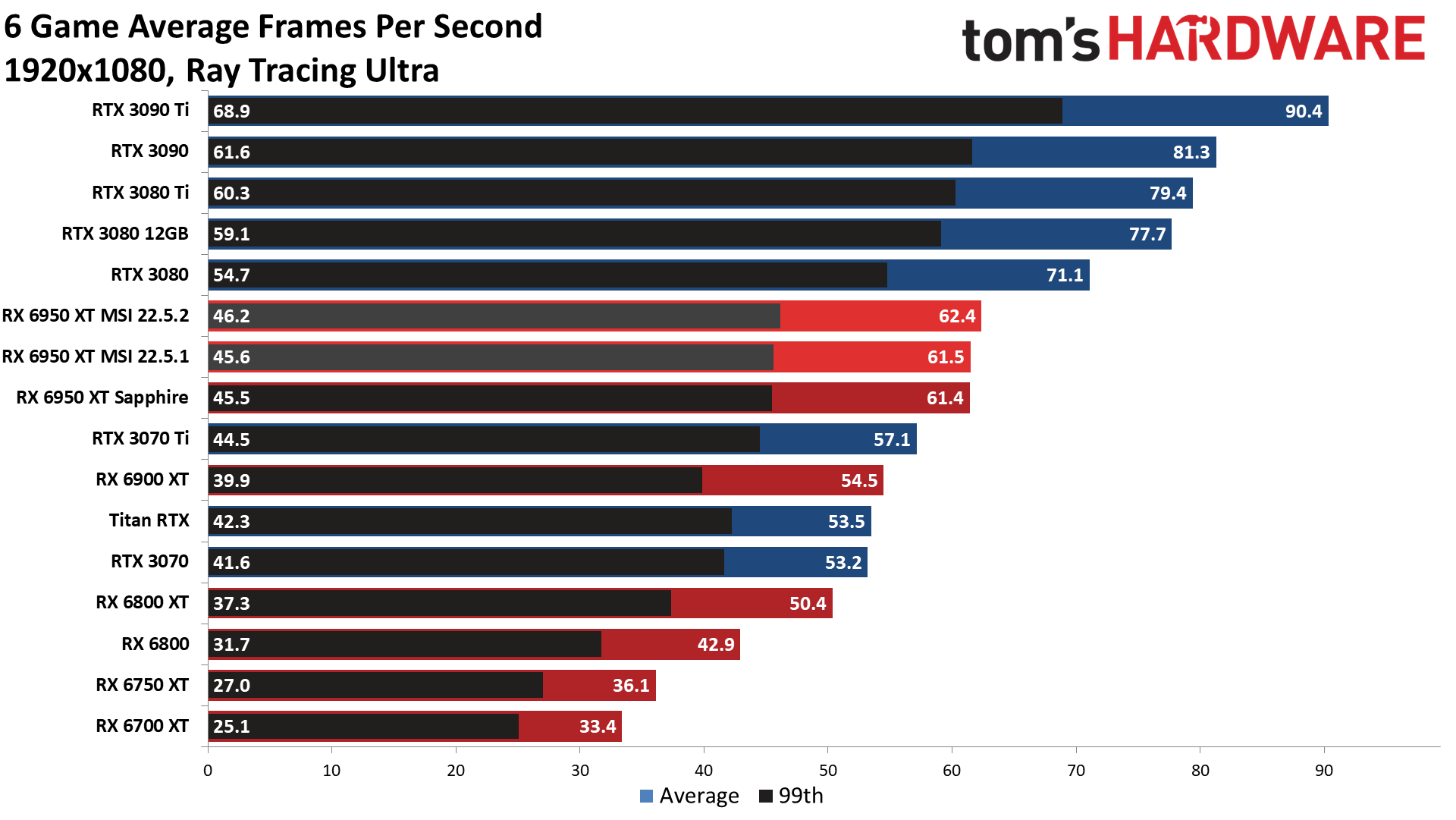
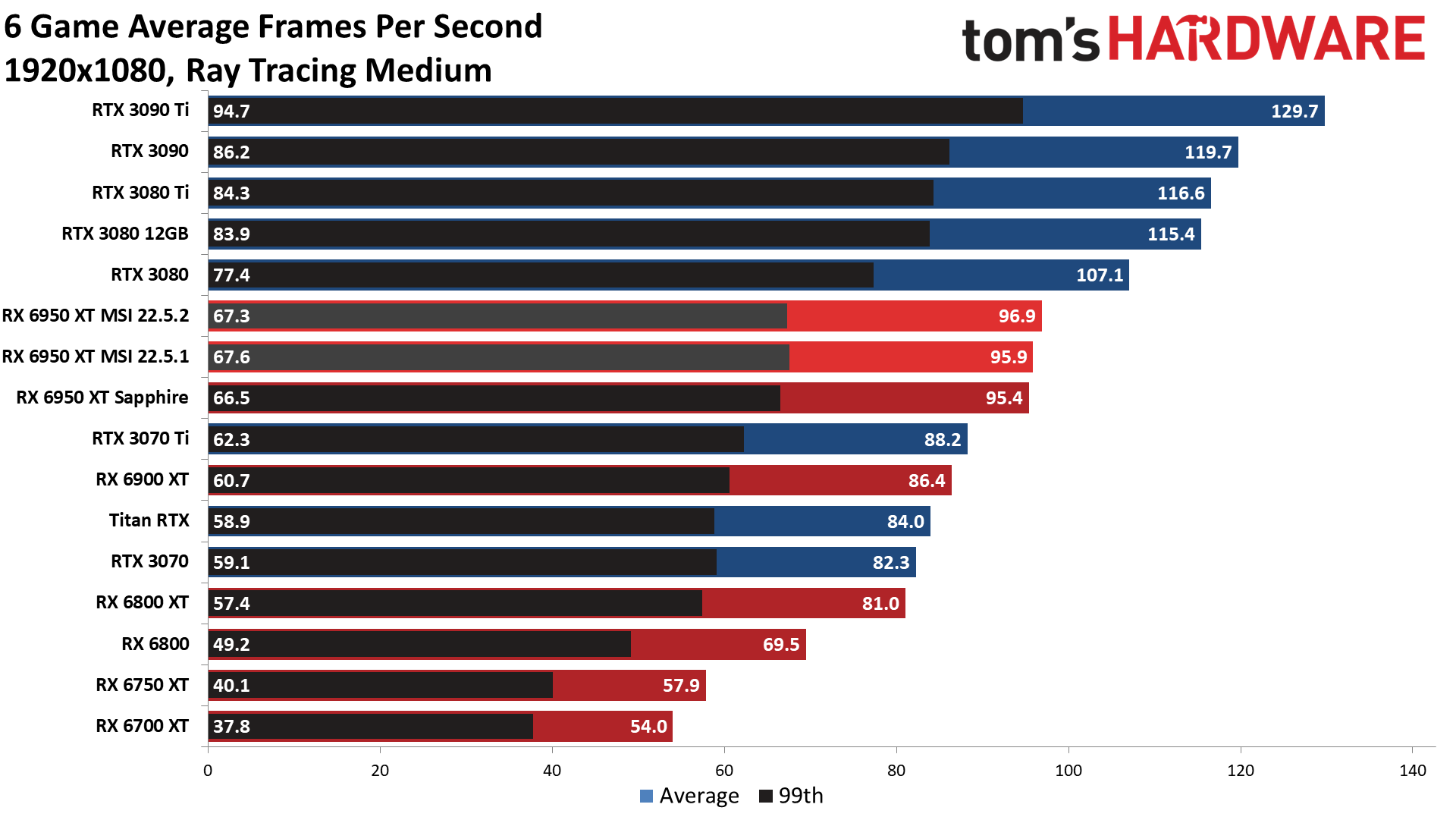
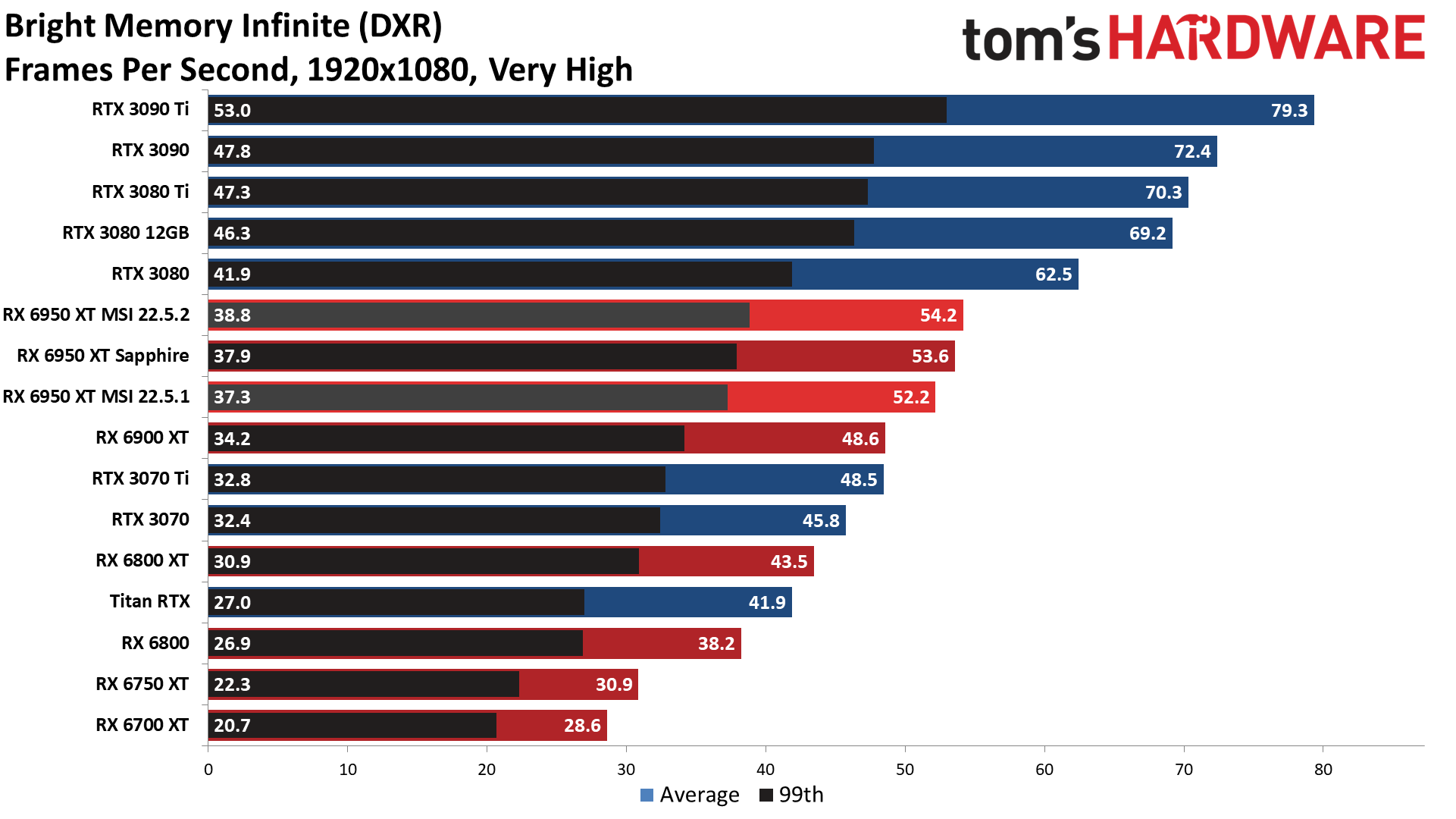
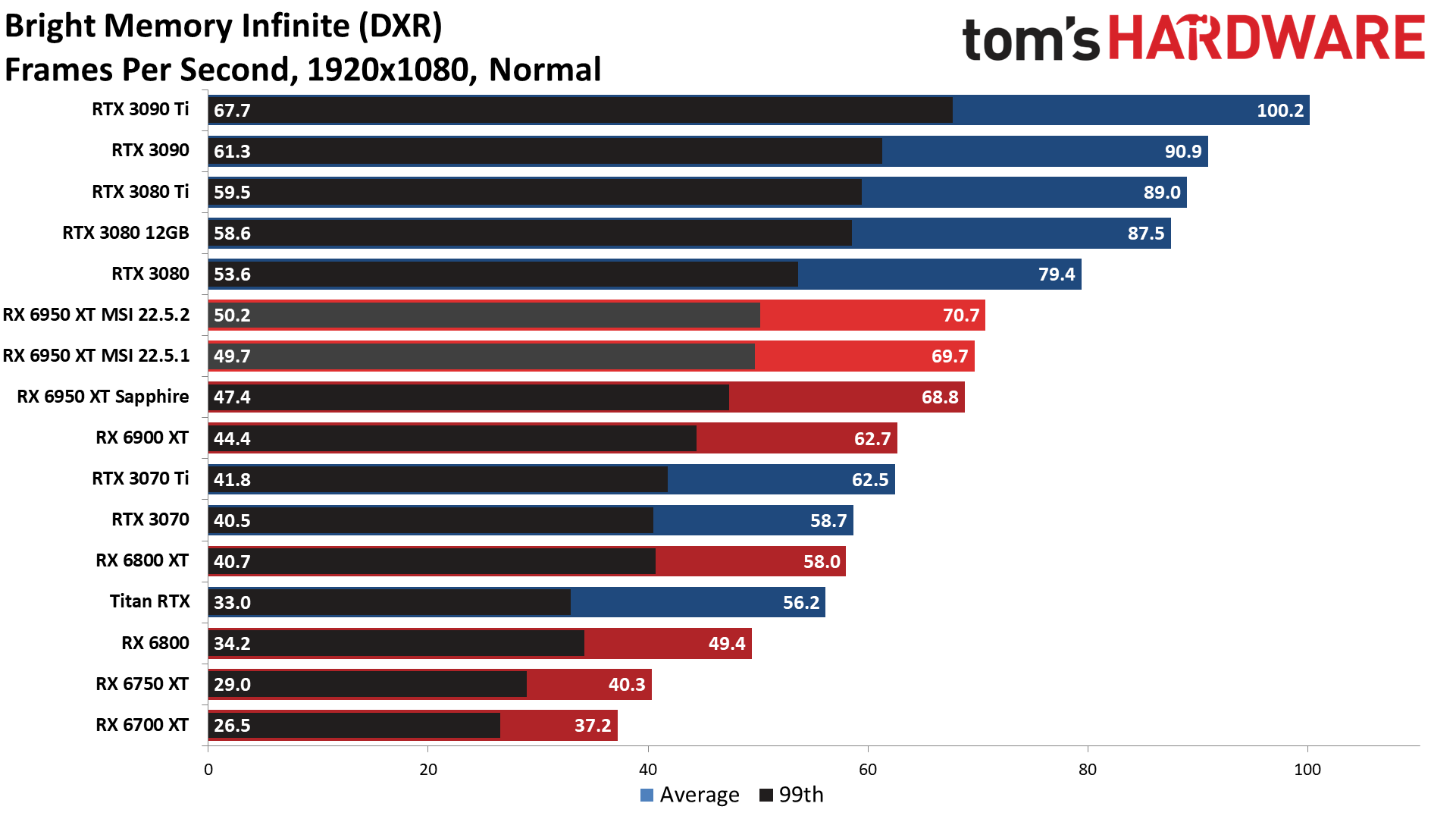
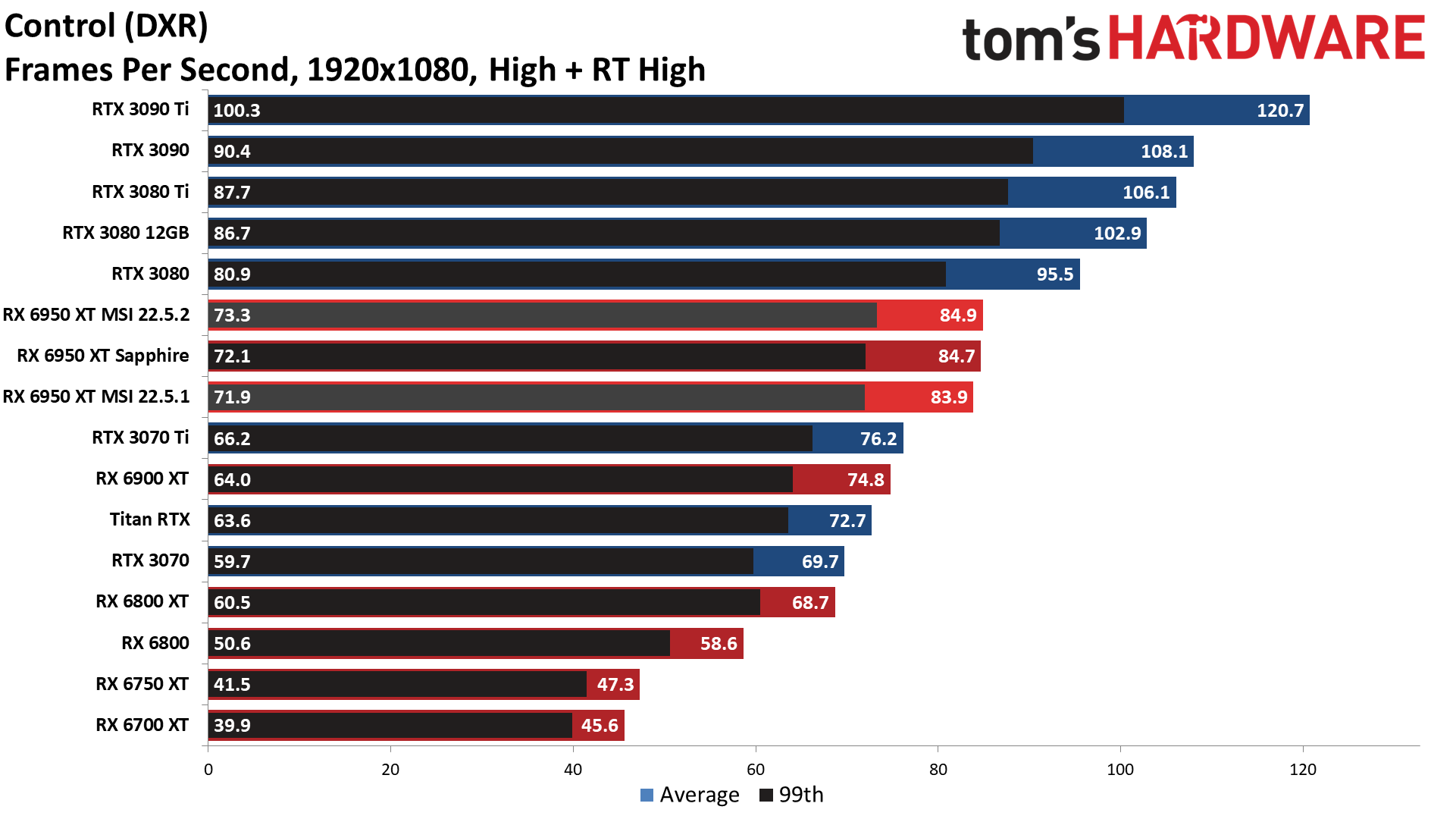
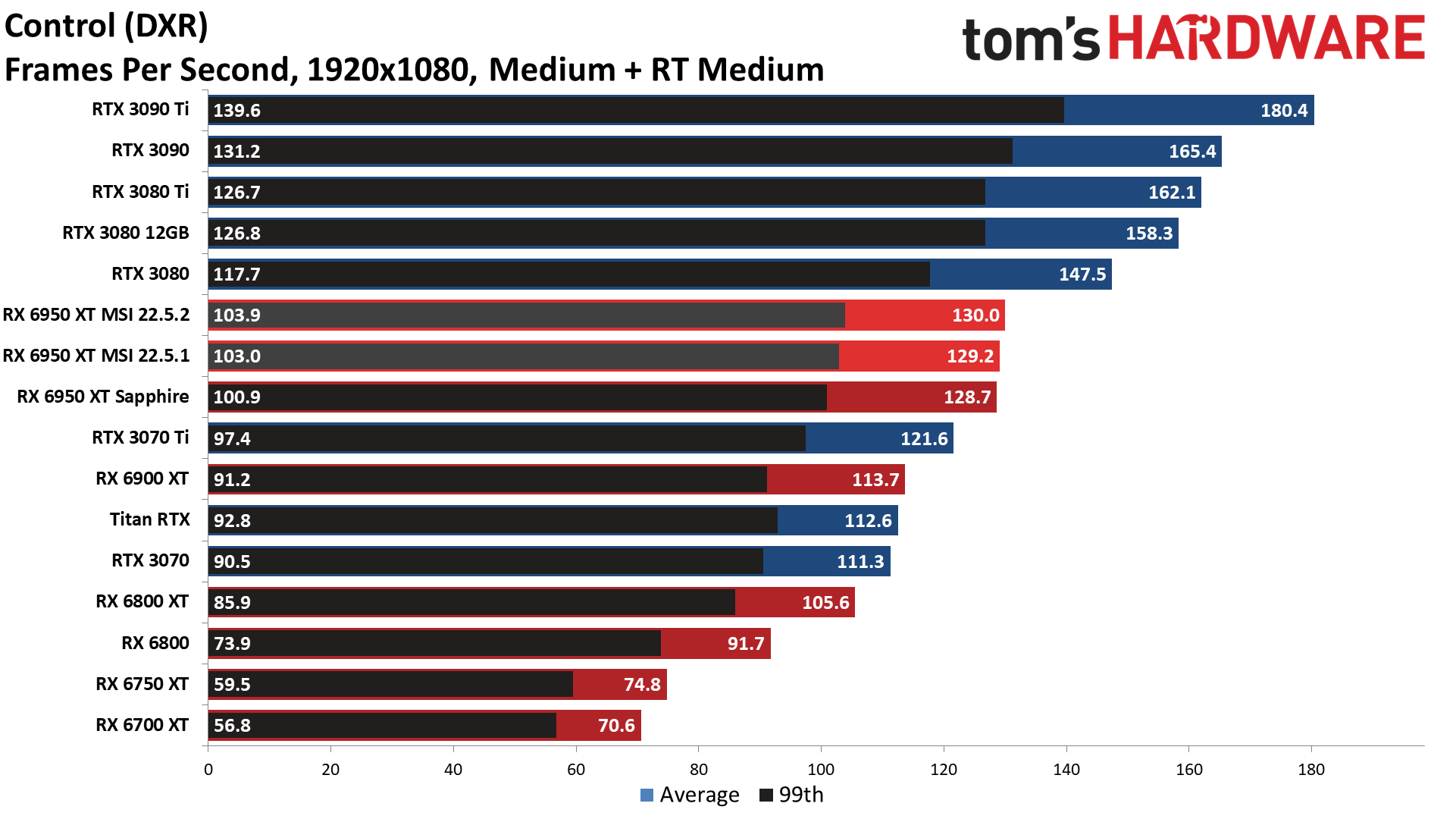
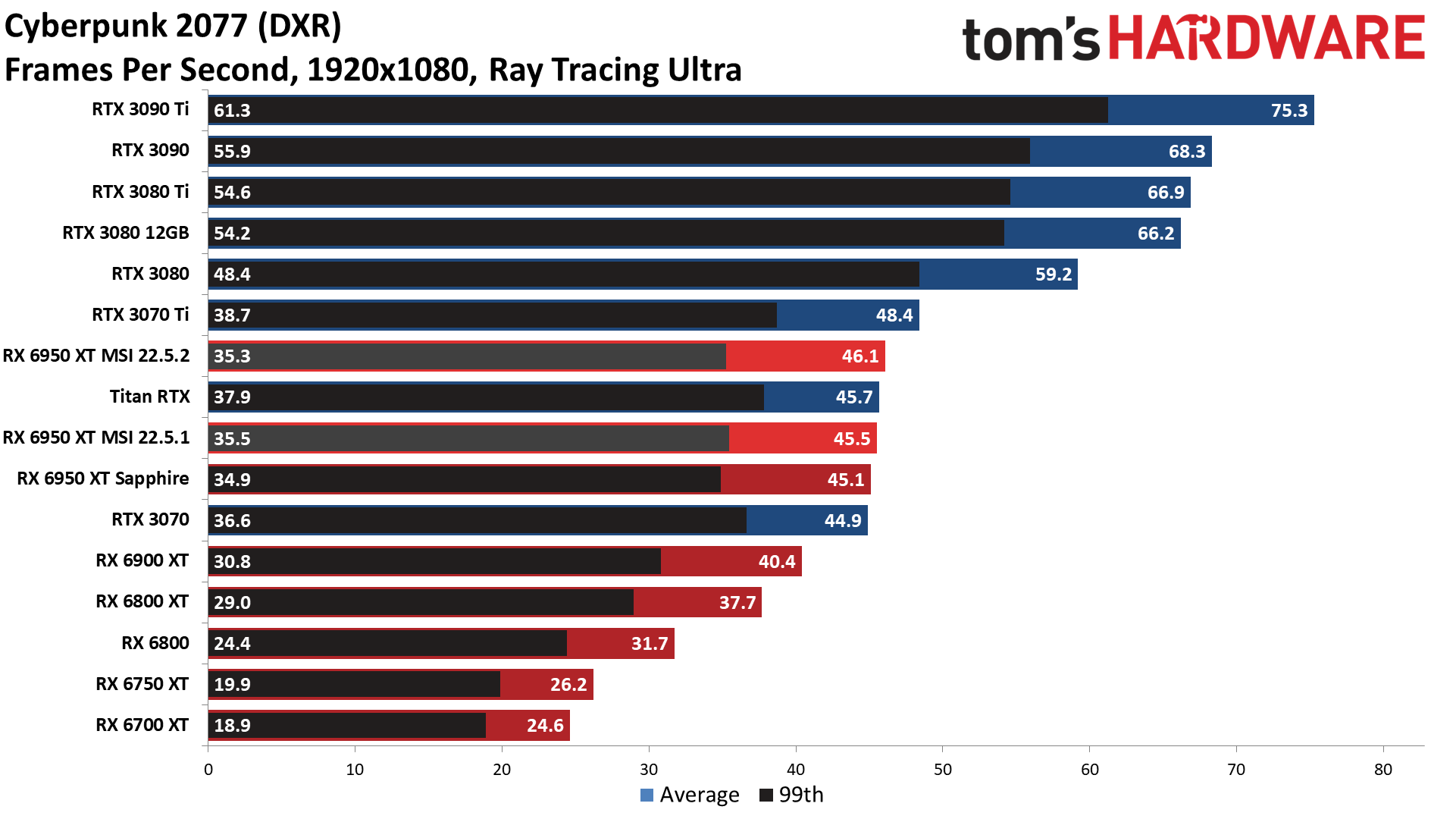
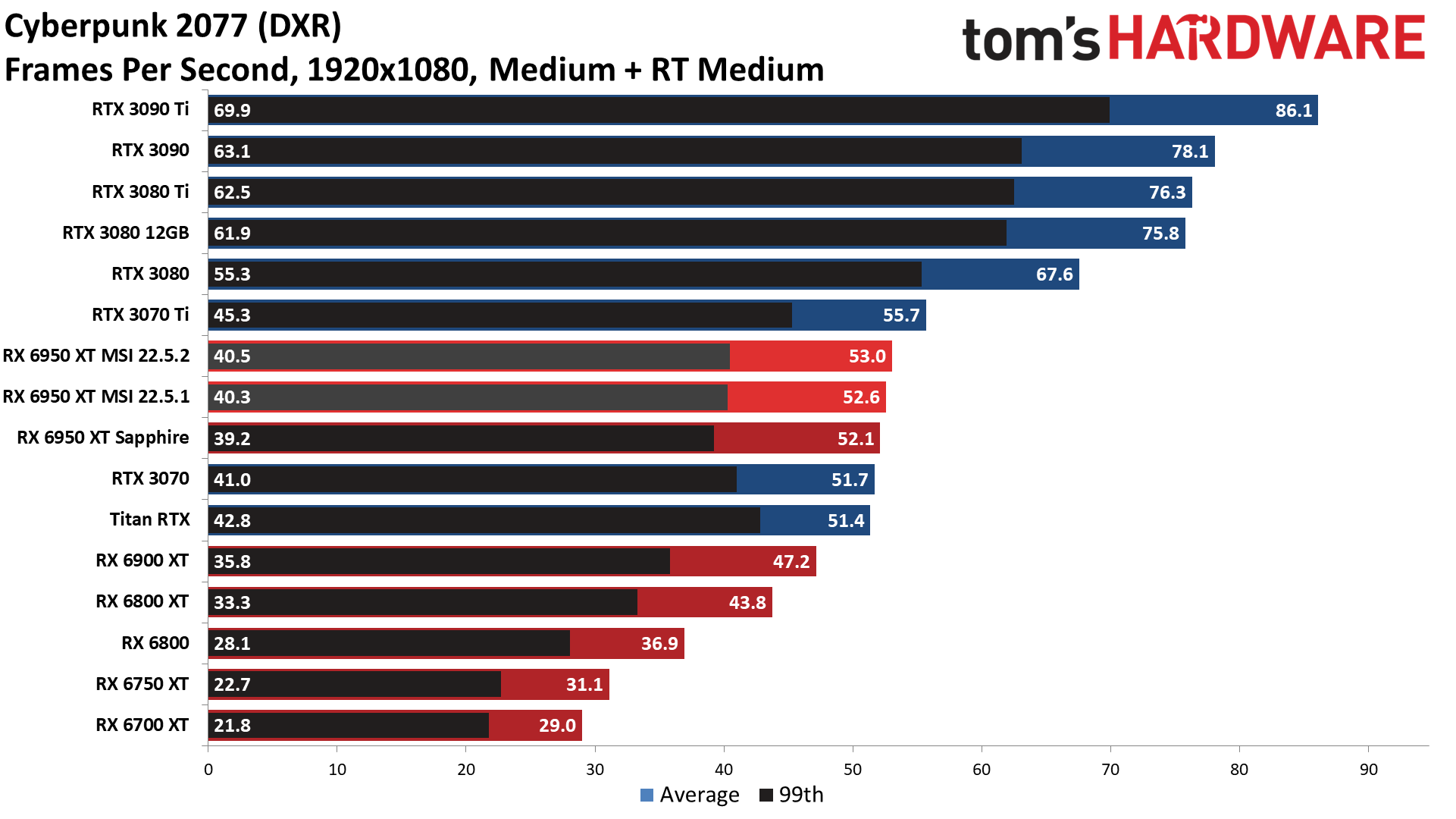
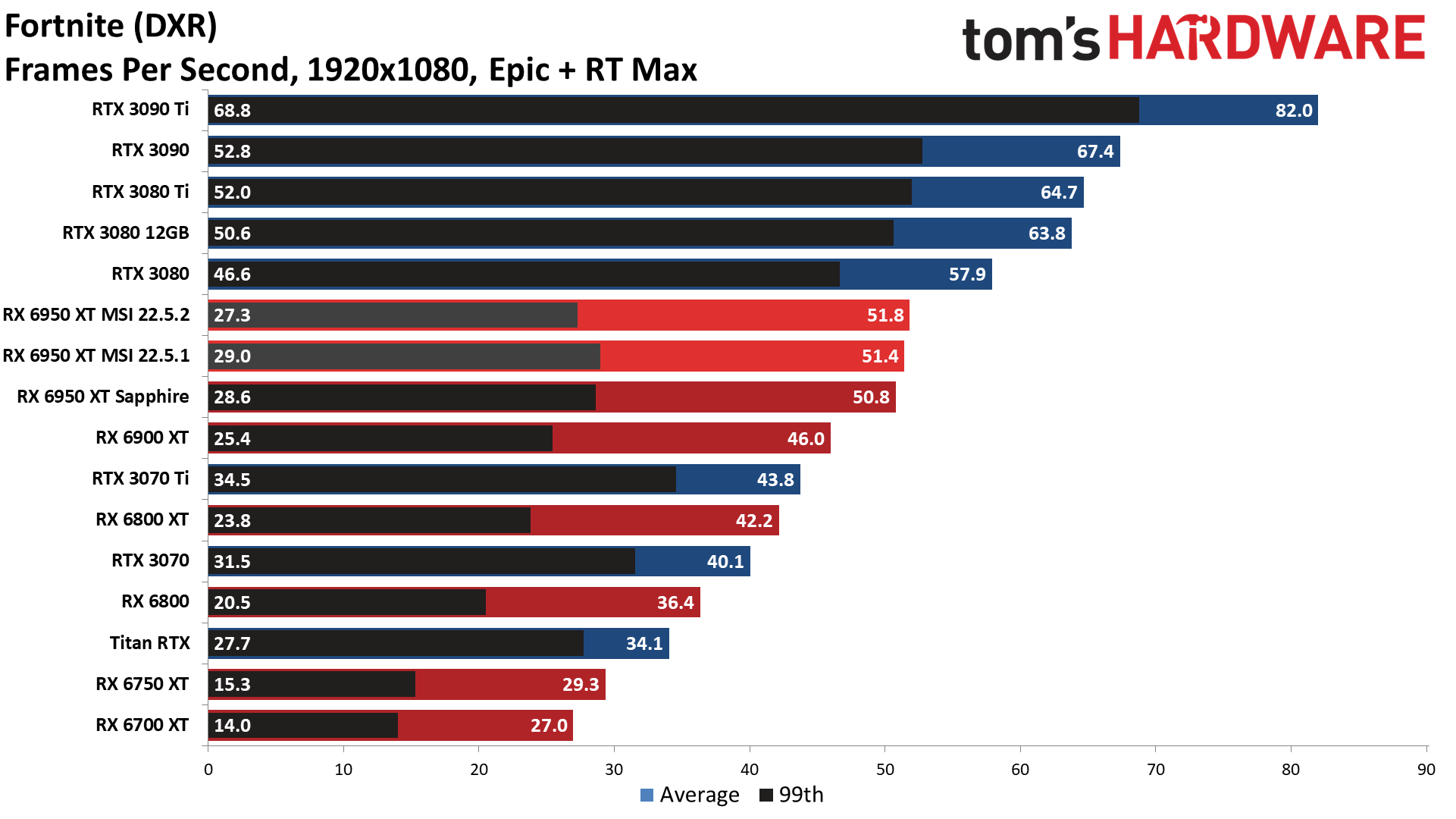
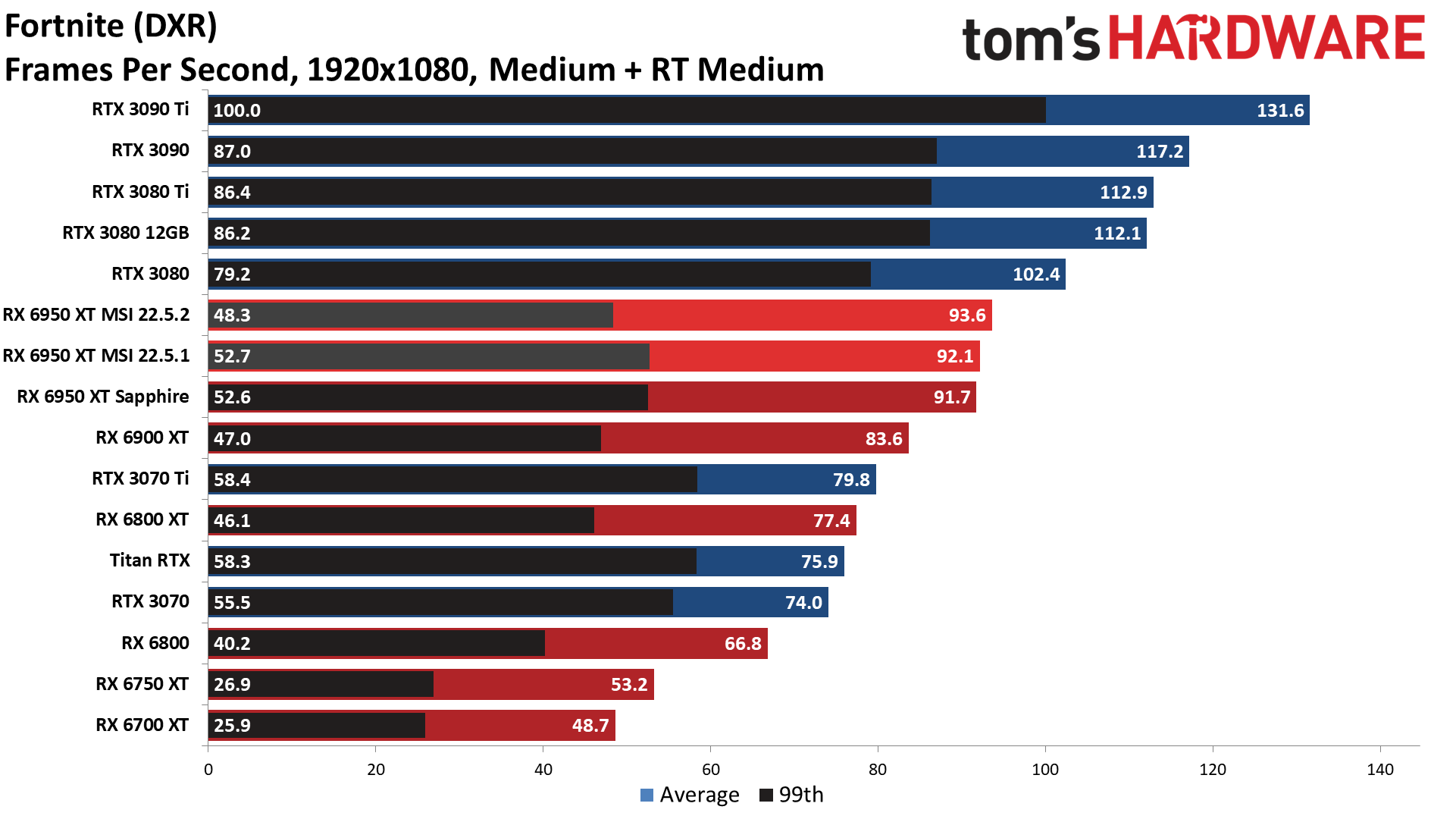
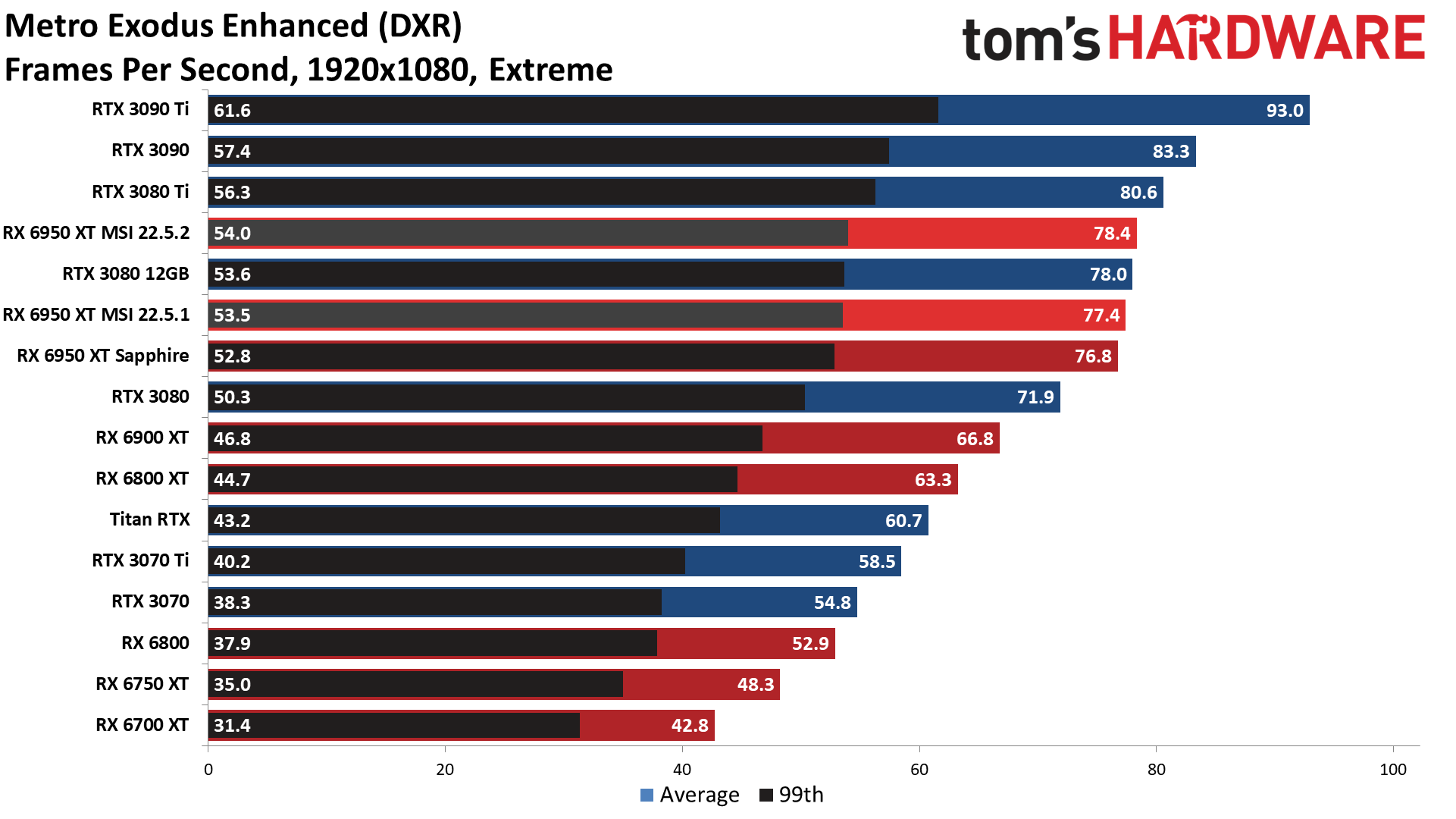
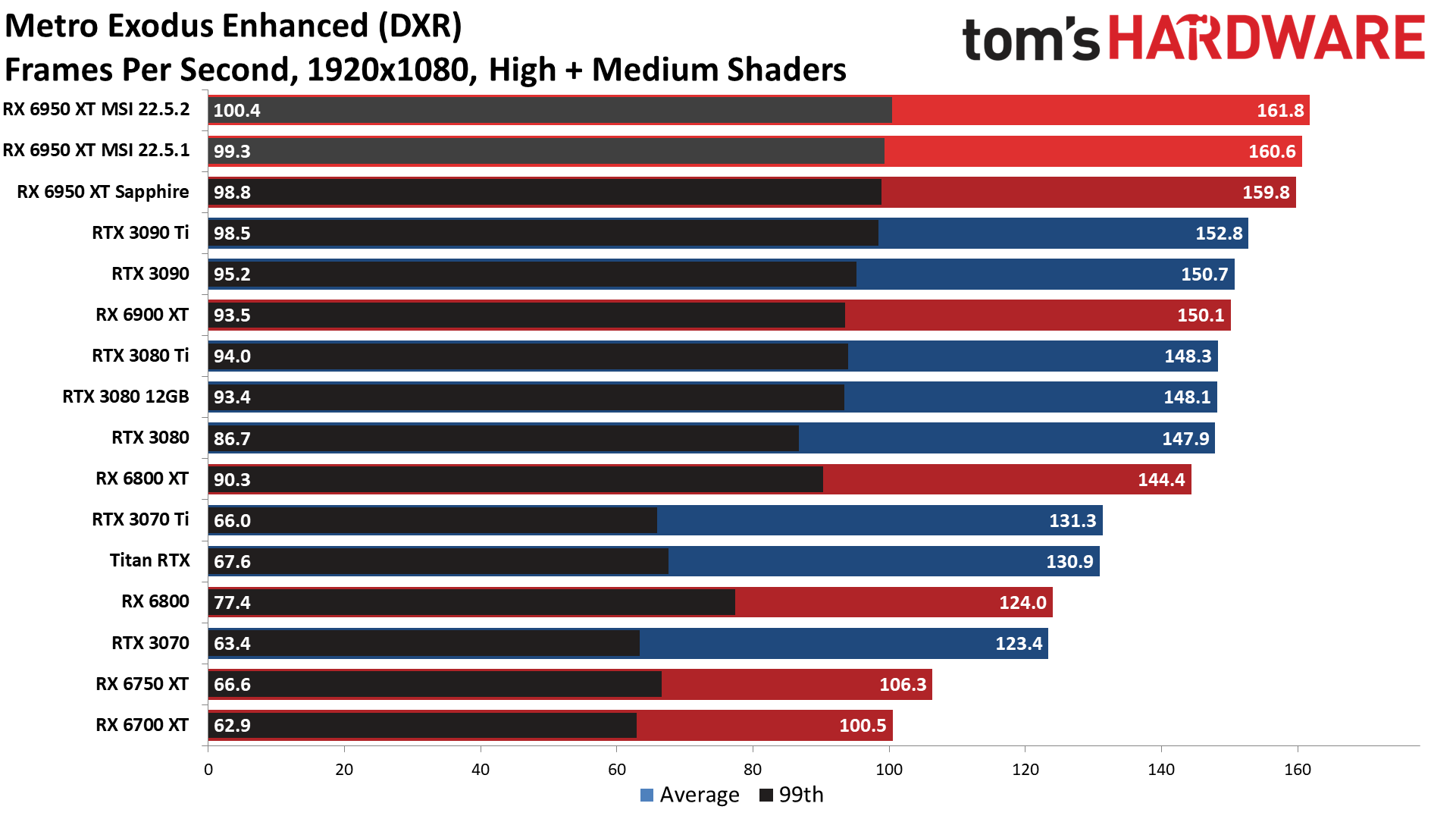
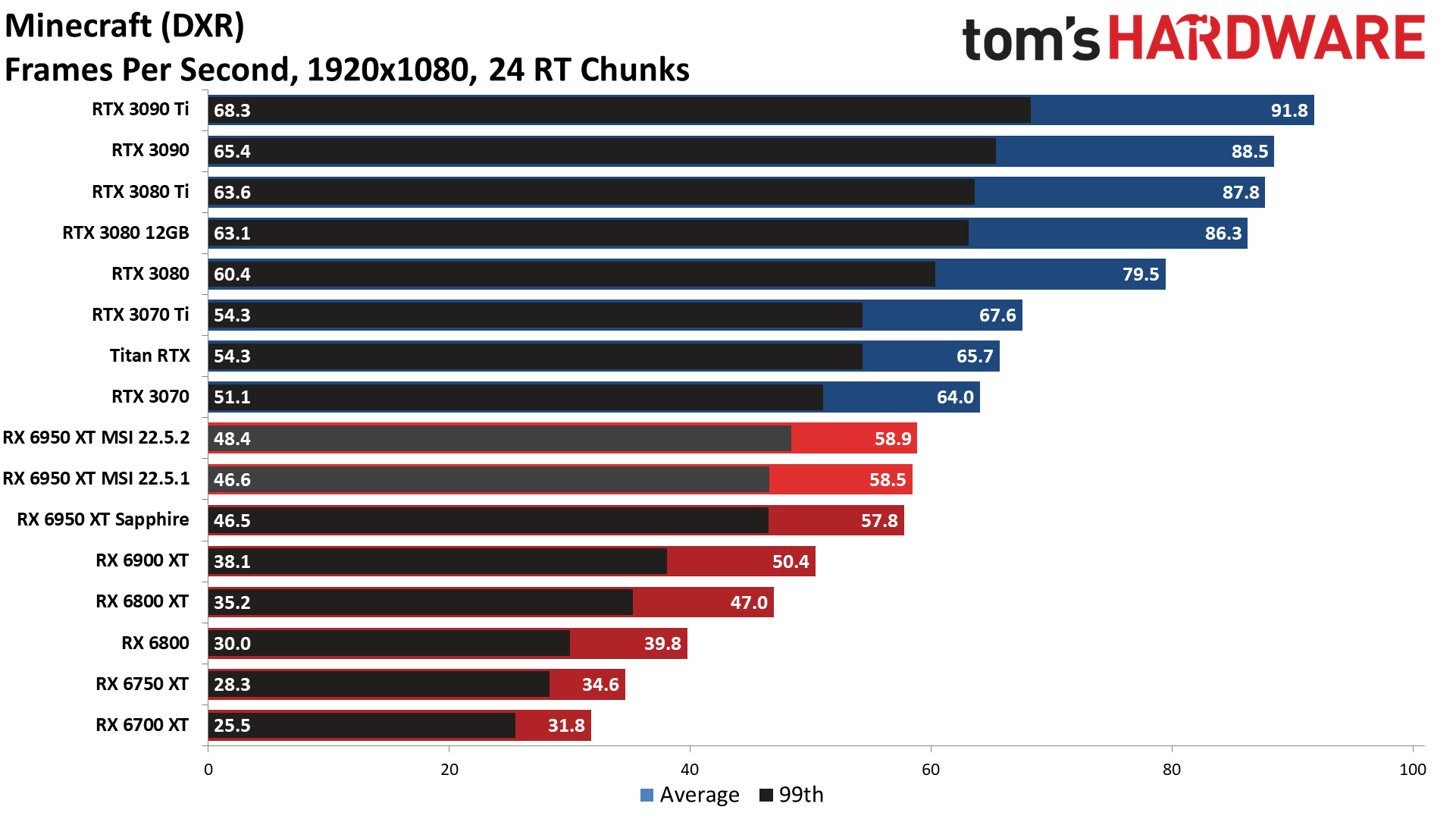
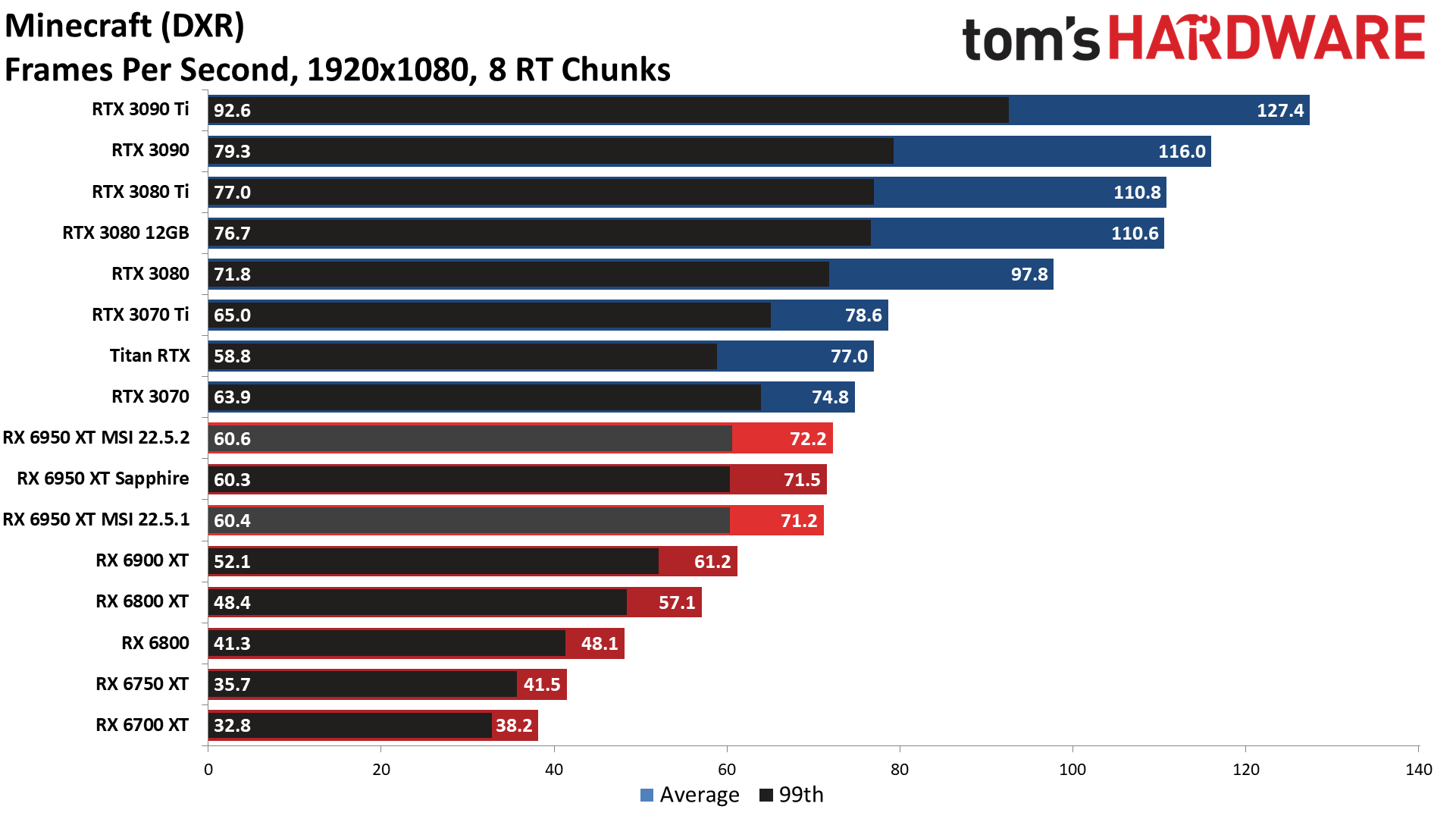
What about ray tracing? The story remained unchanged, with the MSI card still in sixth place overall, leading the Sapphire card by 0.2% if we're being pedantic. The updated drivers aren't necessarily targeted at ray tracing improvements, but we still saw a 1.5% improvement at 1080p ultra. DXR remains so demanding that the RTX 3090 Ti was also still 45% faster than the MSI 6950 XT, though that's slightly closer than at 1440p ultra.
Dropping the settings down to 1080p medium with 'medium' DXR effects, which is a bit of a crock since things can actually look better at 1080p ultra without DXR and tend to run quite a bit better, the RTX 3090 Ti's lead shrank to just 34%. Even with DXR, CPU bottlenecks are apparently a problem at 1080p. But for roughly the same price as the RX 6950 XT, Nvidia's RTX 3080 Ti remained 22% faster at 1080p ultra DXR, and 20% faster at 1080p medium DXR — and that's without factoring in DLSS.
- MORE: Best Graphics Cards
- MORE: GPU Benchmarks and Hierarchy
- MORE: All Graphics Content
Get Tom's Hardware's best news and in-depth reviews, straight to your inbox.
Current page: MSI Radeon RX 6950 XT: 1080p Gaming Performance
Prev Page MSI Radeon RX 6950 XT: 1440p Gaming Performance Next Page MSI Radeon RX 6950 XT: Power, Temps, Noise, Etc.
Jarred Walton is a senior editor at Tom's Hardware focusing on everything GPU. He has been working as a tech journalist since 2004, writing for AnandTech, Maximum PC, and PC Gamer. From the first S3 Virge '3D decelerators' to today's GPUs, Jarred keeps up with all the latest graphics trends and is the one to ask about game performance.
-
-Fran- What a terrible model... The Sapphire is way way better, like always. MSI didn't even try to make this card decent; more like just fulfilling commitments or quotas.Reply
Also, I wonder if toying around with the VRAM speed would yield better results than the core in terms of extra FPS'es and specially power for the 6950XT. I have the 6900XT and I know for sure it does, but it's capped at ~2000, since it starts artifacting heavily above that speed for me. I run it stock, but I wanted to test the limit of it, heh.
Regards. -
King_V Editing nipick:Reply
We are not showing professional application performance with the MSI card, as it was basically the same story as we saw with our initial MSI RX 6950 XT content creation results.
That MSI that's linked should say Sapphire.
Still, given how little benefit pushing the extreme limits of power consumption gave to MSI, I'm really curious about how much, or rather, little, performance might be lost in backing down the power and clocks... I know nobody buys a top-of-the-line card in order to be power-efficient, but I wonder if we might have a situation here that is similar to the underclocking runs for the Vega 56. -
JarredWaltonGPU Reply
I poked around a bit at VRAM speeds when I was doing the Sapphire review. Ultimately, I didn't say much about it, but even though you can push clocks higher, I don't think you get the gains that I'd expect. There's something goofy with the VRAM speeds on these 18Gbps modules where you often don't get anywhere near the theoretical boost in performance relative to the existing 16Gbps cards. I suspect memory timings (which you can't directly see on the GDDR6) are somehow at play.-Fran- said:What a terrible model... The Sapphire is way way better, like always. MSI didn't even try to make this card decent; more like just fulfilling commitments or quotas.
Also, I wonder if toying around with the VRAM speed would yield better results than the core in terms of extra FPS'es and specially power for the 6950XT. I have the 6900XT and I know for sure it does, but it's capped at ~2000, since it starts artifacting heavily above that speed for me. I run it stock, but I wanted to test the limit of it, heh.
Regards.
For example, and I know this is a specific use case, but the cryptocurrency mining speed of the RX 6950 XT was consistently far lower than the RX 6900 XT, regardless of what I tried. You can get ~65 MH/s out of the RX 6900 XT after tuning, but the best I ever managed on the RX 6950 XT was about 54 MH/s. "Stock" (factory) performance with a tweak to the maximum GPU clock did better than any attempted memory overclock. -
-Fran- Reply
That is so weirdly interesting... I wonder if the higher clocks were at the expense of way way looser timings?JarredWaltonGPU said:I poked around a bit at VRAM speeds when I was doing the Sapphire review. Ultimately, I didn't say much about it, but even though you can push clocks higher, I don't think you get the gains that I'd expect. There's something goofy with the VRAM speeds on these 18Gbps modules where you often don't get anywhere near the theoretical boost in performance relative to the existing 16Gbps cards. I suspect memory timings (which you can't directly see on the GDDR6) are somehow at play.
For example, and I know this is a specific use case, but the cryptocurrency mining speed of the RX 6950 XT was consistently far lower than the RX 6900 XT, regardless of what I tried. You can get ~65 MH/s out of the RX 6900 XT after tuning, but the best I ever managed on the RX 6950 XT was about 54 MH/s. "Stock" (factory) performance with a tweak to the maximum GPU clock did better than any attempted memory overclock.
Regards. -
Sleepy_Hollowed Wow, what on earth is this card for? Expensive, inefficient space heater?Reply
Since even messing with voltages does not seem to make performance better, this is an absolute head scratcher, probably a spec-hunter card only.
That being said, other versions of this card will get some real usage with AMD's FSR 2.0 and it will make absolute sense even with zero tensor cores. Losing ~7 frames per second to nvidia is neglible at those resolutions and with comparable quality as well.
Let's see if next gen and DLSS 3.0 might be different, but DLSS 2.x is not.